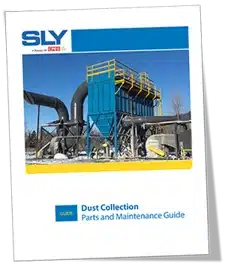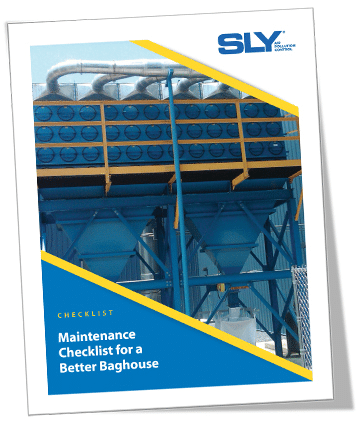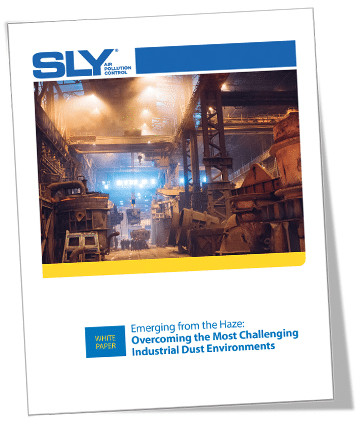Types of Filter Media for Filter Bag Construction
SLY, LLC. offers quality replacement filters for virtually all types and brands of dry material dust collectors.
Types of Dust Collector Filter Bags
The type of filter bag you’ll need to operate your dust collector at maximum effectiveness and efficiency will depend on your machine type and the specific operating conditions. See below for more information on what filter bag is best for your application.
Cotton (woven)
Normal maximum continuous operating temperature is 180°F. Used mostly on shaker-type collectors, general applications include cleaning rooms, atmospheric air cleaning, woodworking applications, cement & rock products, and other general applications handling ambient air. Chemical resistance is poor, and flammability is high. Cotton filters offer good chemical resistance in dry, ambient conditions and are not recommended where mineral acids and oxidizing agents are present. These filters offer good resistance to both flex and flat abrasion. Cotton has excellent clean-down where static charge tends to hold dust cake on other fibers. Cotton is available with a flame-retardant finish.
Cotton Sateen (special woven stitch)
Call for availability information
Polyester
Normal maximum continuous operating temperature is 275°F. Polyester felts offer very good resistance to chemicals, abrasion, and dry heat degradation. They offer excellent dimensional stability and are the most common filter bag used today. Polyester is good for dry heat applications and are superior to other synthetics, with the exception of Nomex® (Aramid) and Teflon® in this regard. Polyester is not a good choice for moist heat and subject to hydrolytic degradation under certain circumstances. Polyester offers good resistance to most mineral and organic acids except high concentration of nitric, sulfuric, and carbolic acids. It has good resistance to weak alkalis and moderate resistance to strong alkalis at low temperature. Polyester also has good resistance to most oxidizing agents and excellent to most organic solvents. It is not recommended for some phenolic compounds. Not recommend for high concentration of strong alkalis at high temperatures.
See also: Duo-Density Polyester (DDPE) / High Efficiency Micro Denier Polyester (SlyHE)
Polyester Sateen (woven)
Call for availability information
High Efficiency Felts (SlyHE, MPS)
Do you need a more efficient filter bag, but don’t want to pay the extreme cost of a PTFE membrane filter? SlyHe felts use micro pore sized fibers to filter fine pollutants. Microfibers are a great solution to fine, uniform, free-flowing dust and fine solids in liquid process slurries.
Polypropylene
Normal maximum continuous operating temperature is 170°F. Polypropylene felt is used for general applications where chemical and moisture attacks other fibers. Polypropylenes offer high strength, excellent resistance to most acids and alkalis. Smoothness of fibers allow good cake release and resistance to blinding. Moisture absorption is virtually non-existent. This fabric media has very good resistance to both mineral and organic acids and generally good resistance to alkalis with the exception of sodium and potassium hydroxide above 200°F. Good resistance to most reducing agents. Polypropylene also has fair resistance to most organic solvents with the exception of ketones, esters, and chlorinated hydrocarbons.
Nylon (Cerex®)
Normal maximum continuous operating temperature is 250°F. Nylon felt is typically used for highly abrasive dust applications. It has good resistance to alkalis under most conditions, but most mineral oxides cause degradation and partial decomposition. High concentrations and temperatures may cause complete degradation. This media holds up to common organic solvents very well.
Acrylic (Homopolymer Acrylic Felt)
Normal maximum continuous operating temperature is 275°F. General applications include: Dryers, Electric furnace, Aluminum reduction and Primary or secondary smelting. The chemical resistance is satisfactory to most mineral and organic acids. Superior to polyamides and polyesters in this regards. Acrylic resistance to alkalis is inferior to most fibers except natural protein fibers such as silk and wool. Acrylic has fair resistance to most oxidizing agents and is superior to polyamides and protein fibers in this respect. It has excellent resistance to most common organic solvents. Overall Acrylic has good acid resistance, high resistance to hydrolysis. Not available in all fabric forms and is more costly than polyester or polypropylene. Good temperature resistance.
High Temperature Filter Media Choices
Click on media name below for media details, types of finishes and fabric weights available.
Aramid (Nomex®)
Normal maximum continuous operating temperature is 375°F. General applications for Aramid felt include Highly abrasive dust applications, Electric arc furnaces, High-temperature dryers, Cupolas, and chemical applications where high temperatures exist. Aramid offers a good resistance to alkalies under most condition. Most mineral oxides cause degradation and partial decomposition. Aramid withstands common organic solvents very well. Some phenolic compounds cause solubility.
Fiberglass
Normal continuous operating temperature is 500°F. General applications include Cement kilns, High-temperature dryers, Carbon black reactors, Power plants, and Electric furnaces. Fiberglass has excellent resistance to most acids, but is attacked by hydrofluoric acid. Not recommended where bases and salts such as chlorides, bromides, and cyanides are present. This media has poor flex abrasion qualities and requires a 20 vertical wire minimum support cage when used in tubular bag form.
P84® (Polyimide)
Normal maximum continuous operating temperature is 500°F. Common applications for this felt include: smelters, dryers, coal-fired boilers, incinerators, kilns, and calciners. P-84 is nonflammable and not hydroscopic. This felt offers extended bag life in low pH applications and helps reduce differential pressure across the baghouse. The felt operates well in high temperature applications, against acid attacks and is resistant to flex abrasion. Alkaline should be avoided at high temperatures when using this media.
PPS (Polyphenylene Sulfide)
(Commonly known brands: Ryton® or Procon®) Normal maximum continuous operating temperature is 375°F. Common applications include: Coal-fired boilers, Incinerators, Fluidized bed systems, cement mills, oil and gas firings, asphalt plants and Pulverized coal injection systems. Ryton® has excellent resistance to both acids and alkalis. The media also has the ability to operate effectively on applications with O₂ content up to 9%. Ryton® works well in high moisture content applications and where dew point crossings are common. This media is suited for applications where emissions standards are tight.
Teflon® (Fluorocarbon fiber)
Normal maximum continuous operating temperature is 500°F. Generally used for severe chemical environments at high temperatures. Common applications include coal-fired power plants, cement production, and steel foundries. Chemical resistance is excellent, and abrasion resistance is generally superior to protein fibers but not as good as most synthetics. Teflon® has an extreme high cost and is typically used after everything else has failed. Teflon® is available in both a woven and a felt finished product. This media has poor flex abrasion qualities and requires a 20 vertical wire minimum support cage when used in tubular bag form.
High Efficiency Felts (SlyHE)
Do you need a more efficient filter bag, but don’t want to pay the extreme cost of a PTFE membrane filter? SlyHe felts use micro pore-sized fibers to filter fine pollutants. Microfibers are a great solution to fine, uniform, free-flowing dust and fine solids in liquid process slurries. Click here for more information…




 Once you have a dust collector, you need to perform regular inspections and maintenance on your equipment to keep it running properly. That means being proactive with your maintenance and changing out parts before they go bad. Only then can you ensure the safety of your workers and the success of your business.
Once you have a dust collector, you need to perform regular inspections and maintenance on your equipment to keep it running properly. That means being proactive with your maintenance and changing out parts before they go bad. Only then can you ensure the safety of your workers and the success of your business. For improved performance and reliability of your dust collection equipment, Sly recommends a schedule of routine inspections and the timely repair of damaged or malfunctioning equipment. This convenient checklist covers all styles of dust collectors and aspects of baghouse maintenance including pressure drop, emissions, exhaust, ductwork and more.
For improved performance and reliability of your dust collection equipment, Sly recommends a schedule of routine inspections and the timely repair of damaged or malfunctioning equipment. This convenient checklist covers all styles of dust collectors and aspects of baghouse maintenance including pressure drop, emissions, exhaust, ductwork and more. In this white paper, you'll learn why being flexible is the great solution for dust collection: The Importance of Dust Control, The Confluence of Kst and Pmax for Combustibility, Conducting a Dust Hazard Analysis, Case Study on a Customized Solution.
In this white paper, you'll learn why being flexible is the great solution for dust collection: The Importance of Dust Control, The Confluence of Kst and Pmax for Combustibility, Conducting a Dust Hazard Analysis, Case Study on a Customized Solution.